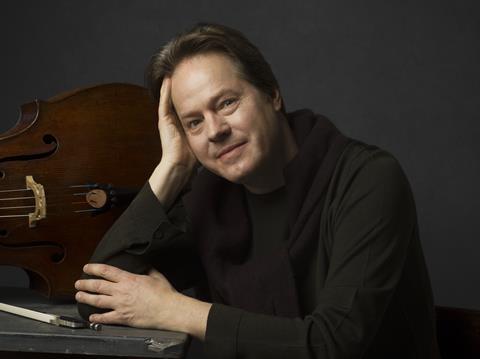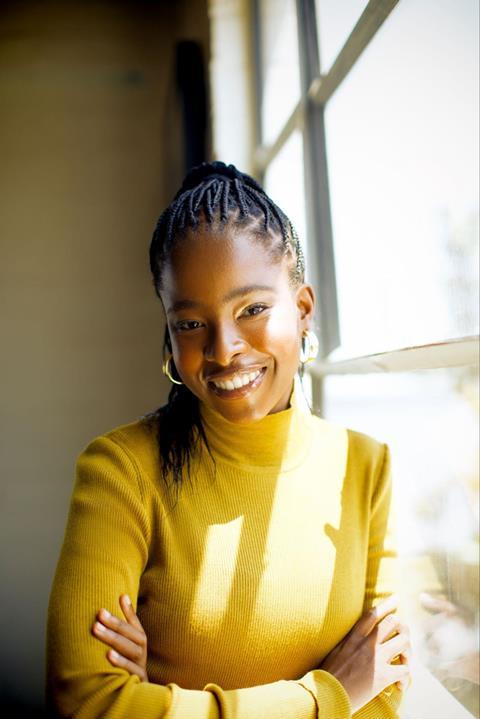The German cellist tells The Strad how the interdisciplinary project, which will put Bach alongside modern poetry, took form

Discover more Featured Stories like this in The Strad Playing Hub
On 17 February 2024 German cellist Jan Vogler will take to the Carnegie Hall stage with US poet Amanda Gorman – hailed for her performance at President Biden’s 2021 inauguration. The duo will pair Bach’s Cello Suites with poetry written and performed by Gorman. Vogler talks to The Strad about how the interdisciplinary project came about, his long-standing passion for poetry, and why he doesn’t yet know all the words that will be performed that evening!
How did the project come about?
At first the plan was to play all six Bach Suites at Carnegie Hall, repertoire that I love and have worked on for most of my life. I know that this magical music can capture even a large audience and create intimacy. But I felt there was something missing, an element of surprise and contemporary, fresh inspiration!
I thought back to my project New Worlds with actor Bill Murray and how wonderful it was to play for new audiences and see classical music in a different light. That’s when I had the idea to reach out to Amanda Gorman. I had seen her spectacular appearance at the inauguration and immediately became a fan of her poetry. I grew up reading poetry by Rilke, Hesse, Hölderlin, and Heine, during my childhood and youth in East Berlin. Later, after moving to New York City, I discovered Walt Whitman and Lucille Clifton among others. Poetry is very close to music: the rhythm, the sound, the inner pictures it creates. It is a bridge to music, but one that I felt is underrepresented in today’s concert halls.
I finally met Amanda last year when she presented her new book in New York. I was happy to see that she was captivated by the idea of performing alongside this 300-year-old music and to be in dialogue with my cello, which was made around the same time.
What is it about Gorman and her poetry that you enjoy?
She has a certain rhythm in her poetry. Like all great poets, has an amazing vocabulary at her disposal. And something rather rare, she is also a fantastic reader of her own work – she is an amazing performer! There’s an enthusiasm in her voice and excitement for her ideas and vision. In terms of content, she is ahead of our time and her work answers key questions we all think about. It gives me hope that there are young people like Amanda, who are seeing a better world, beyond the realities that make it sometimes hard to dream!
Working with a contemporary poet of such stature and creative power is something I want to bring to our classical music world. I am beyond excited and feel that a collaboration like this is really the core of my interest at this point in my life.

Was the idea for the project to mix the poetry and music, or leave them separate?
We decided that simplicity would be the right approach. Bach’s music has such incredible power and so does her poetry! Amanda will read her poems between the movements. I will start with the Prelude and she will answer with a poem, after that the Allemande and Courante appear together. The Sarabande – a thoughtful dance that inspires thought – will be framed by two poems, followed by the two remaining movements of the suite.
Which Suites have you decided to include?
We will begin with the First Suite in G major, the genius invention of the solo suite in such an elaborate and yet simple way, followed by the contrasting Fifth Suite in C minor. The scordatura, the tuning of the A string to G, gives the suite a dark and enigmatic aura. After intermission we are going to combine the Third Suite in C major with her work. And for encores we might even overlay music and poems.
Are the music and poetry supposed to contrast or complement each other?
Hopefully both! It is a premiere for both of us and that brings a fun element of surprise to the concert. Her presence will influence my interpretation strongly. It is similar to playing with a new partner in music, a conductor, orchestra, pianist! When you go out on stage with a strong partner you gain an amazing freedom, a feeling of collaboration and shared energy.
Amanda also reserves the right to change the poems at the last minute, giving herself the chance to answer whatever might be on the audience’s mind that particular day. I not only respect that choice but find it incredibly interesting!
How do you think Bach and your Stradivari captivated her?
Amanda is very much immersed in history and it seems to me that the dialogue with Bach’s and Strad’s genius is perhaps as captivating for her, as it is for me to look into the future through the lense of her art! The cello suites by Bach have become so popular because of the combination of depth, simplicity and choice of instrument. I have the great fortune to play on the ‘Castelbarco-Fau’ Stradivari cello, which guides and inspires me. The thrill of this new collaboration is that I will have to prove the immortality and relevance of Bach’s music and classical music in general in a very new situation. And isn’t that the challenge of each concert?
The performance will take place at 8pm on 17 February 2024 at Stern Auditorium/Perelman Stage at Carnegie Hall in New York City
Listen: The Strad Podcast Episode #43: Jan Vogler on music festivals
Read: Masterclass: Jan Vogler on Beethoven Cello Sonata op.69
Discover more Featured Stories like this in The Strad Playing Hub
The number one source for playing and teaching books, guides, CDs, calendars and back issues of the magazine.
In The Best of Technique you’ll discover the top playing tips of the world’s leading string players and teachers. It’s packed full of exercises for students, plus examples from the standard repertoire to show you how to integrate the technique into your playing.
The Strad’s Masterclass series brings together the finest string players with some of the greatest string works ever written. Always one of our most popular sections, Masterclass has been an invaluable aid to aspiring soloists, chamber musicians and string teachers since the 1990s.
American collector David L. Fulton amassed one of the 20th century’s finest collections of stringed instruments. This year’s calendar pays tribute to some of these priceless treasures, including Yehudi Menuhin’s celebrated ‘Lord Wilton’ Guarneri, the Carlo Bergonzi once played by Fritz Kreisler, and four instruments by Antonio Stradivari.













































No comments yet